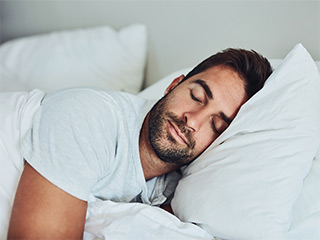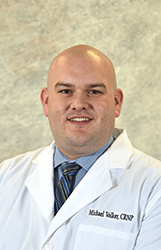A Good Night’s Sleep in Anxious Times

By: Michael Volker, CRNP
During office visits, it’s not unusual for patients to tell me they’re experiencing stress and anxiety due to the pandemic, and it’s spoiling their sleep. This is normal, I tell them: COVID-19 messes with our lives in many ways, including our ability to sleep well.
Getting a good night’s sleep is more important than ever in these troubled times. If you’re well rested, you lower your risk of getting sick, reduce stress and depression, and generally feel better.
Here are some tips I give my patients who are having trouble sleeping. They’re designed to put your mind at ease so you can get restful, healthful sleep.
Understand what makes you anxious
Think about why your anxiety is bad at bedtime and what you can do to ease it. Do you watch TV news at night? Spend time on social media? Worry that you’re going to get the virus? All these can raise your anxiety level and increase sleeplessness. While it’s impossible to shut off all worry, it helps to avoid things that make you anxious, especially at bedtime.
Exercise during the day
Moderate exercise for at least 30 minutes five or more days a week can help you relax and fall into a deep sleep. Moderate exercise could be a brisk walk where you can still carry on a conversation. Vigorous exercise, like running, is also good, but do it at least two hours before going to bed.
Limit nap time
Long daytime naps can interfere with nighttime sleep. If you do nap, limit yourself to 30 minutes and avoid napping late in the day.
Avoid alcohol and caffeine
Both of these can mess up your natural sleep rhythms and cause wakefulness. Stop drinking alcohol at least two hours before bed, and try not to drink caffeinated beverages after 2 p.m.
Instead, try herbal teas in the evening to relax and unwind. Popular choices include chamomile and lavender, available in many stores.
Develop a bedtime routine
Having a regular bedtime routine tells your mind and body it’s time to slow down and prepare for sleep. Tailor your routine to your own needs, but it could include:
- Keep to a sleep schedule. A regular bedtime helps maintain your body’s internal clock.
- Prepare your bedroom. At night, you want a dark, quiet and cool room to fall asleep. Try adjusting your thermostat to a lower temperature, changing to cotton or bamboo linens, or taking a shower/bath before bed.
- Wash your sheets regularly. Clean linens can also help you fall asleep faster.
- Quiet your mind. Before you go to bed, empty your worries and anxieties. For example, write down what you have to do the next day and then put it in a drawer. Or write down your anxious thoughts, then crumple the paper and throw it away to let your worries go.
- Turn off your TV, phone and other electronics at least one hour before bed. Using devices in the bedroom leads to higher insomnia, a later wake-up time, shorter sleep duration, and greater fatigue. If you are watching TV or using your phone at night time, turn on the blue light filter or wear blue light filtering glasses.
- Find relaxing bedtime activities. Calm your mind by reading a book, listening to soothing music, deep breathing, or meditating.
Try melatonin instead of sleeping pills
Melatonin is a hormone in your body that plays a role in sleep. It is available as a supplement, which some people take to help them fall asleep. Melatonin is not habit forming. Try to avoid other night time medications, such as Tylenol PM or Advil PM. These contain diphenhydramine (Benadryl). Usually they only help you fall asleep and do not promote restful sleep, and diphenhydramine can also become habit forming.
If you wake up
If worry makes you wake up in the middle of the night, try this:
- Don’t lie there, get out of bed.
- Remove yourself from the bedroom or sit in a chair in the bedroom.
- Do screen-free activities to get sleepy again.
Know when to contact your doctor
During this time of COVID-19, nearly everyone has an occasional sleepless night, but if your sleeplessness continues, contact your MPCP provider. We can help you identify and treat any underlying causes that may be keeping you from a good night’s sleep.
More resources for you:
9 Resources for Coping with Coronavirus Anxiety, Healthline
9 Tips for A Good Night’s Sleep, Psych Central
 Michael Volker, Certified Registered Nurse Practitioner, received his B.S. in Nursing degree from University of Maryland Baltimore School of Nursing and his M.S. in Nursing degree from Walden University, Minneapolis, Minnesota. Mr. Volker is certified by the American Academy of Nurse Practitioners. He sees patients in the Arundel Mills office.
Michael Volker, Certified Registered Nurse Practitioner, received his B.S. in Nursing degree from University of Maryland Baltimore School of Nursing and his M.S. in Nursing degree from Walden University, Minneapolis, Minnesota. Mr. Volker is certified by the American Academy of Nurse Practitioners. He sees patients in the Arundel Mills office.





